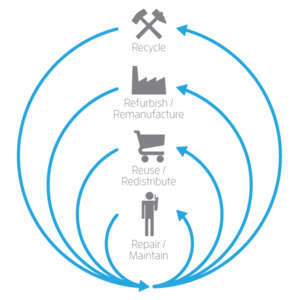In light of the vote to leave the European Union, over a series of blogs I will be looking at the question of a circular economy.
What are the goals? How do they impact producers and the wider economy? How can Extended Producer Responsibility (EPR) help us achieve these goals and where should we start?
What is the circular economy?
The circular economy is an economy which focuses on maintaining value within resources and products, minimising loss through disposal or destruction and reintroducing the materials and resources at end of life back into the economy ready to be used again.
It aims to move us from our current linear consumption patterns of digging up resource, manufacturing products, consuming and disposing to a circular consumption pattern where we manufacture, consume, recycle/reuse and remanufacture.
The Ellen MacArthur Foundation’s report invites readers to change their perspective towards a more circular economy.
Why should I care about a circular economy?
Resources are scarce. Over the long run, prices for natural resources will increase as extraction becomes more complicated and transportation costs increase. This will directly impact manufacturers and consumers. Countries such as China and India have spent the last two decades acquiring controlling stakes in mineral deposits across the globe. The Chinese Ministry of Land report details the inspiring levels of natural minerals that the Chinese control. In the face of this, manufacturers in western economies will face scarcity, not only from the sheer level of resource humans use but the control of these resources by certain economies. Surely, in the face of these challenges these manufacturers will require a secondary source of materials to ensure their continuity? A circular economy can provide this alternative source of resources.
Western economies have gone through a period of consumption led growth since the Second World War. This means that compared with the rest of the world, to put it simply, we have a lot of stuff (products).
The challenge is to do something useful with these products when they reach the end of their life, or end of their productive cycle. By questioning how we can better use raw materials to create these products to produce new products through repairing, reusing, remanufacturing or recycling.

Ideally, we should “design out waste”. This is where at conceptual level, products are designed to be easy to repair or remanufacture. An excellent example of this would be the company Fairphone. They have designed a modular smartphone that’s easy to repair and upgrade.
Considering the end of life or the end of the productive cycle when designing the smartphone allows Fairphone to dramatically lower the costs of repairing or reusing the phone to return it to market. In the long run this dramatically reduces the raw material usage in bringing the product to market. This is an excellent example of how a circular economy can work for an individual company.
Why is it important now?
Almost all legislation set up to progress the UK towards a circular economy comes from a European Directive. With the vote to leave the European Union it gives the UK the opportunity to forge our own path towards a circular economy. One that is a perfect fit for our economy’s needs.
What is Extended Producer Responsibility? (EPR)
The regimes we have in the UK (Packaging, WEEE, Batteries & End of Life Vehicles) fall under the definition of EPR. The Organisation for Economic Cooperation and Development (OECD) defines EPR as:
“A policy approach under which producers are given a significant responsibility – financial and/or physical – for the treatment or disposal of post-consumer products. Assigning such responsibility could in principle provide incentives to prevent waste at the source, promote product design for the environment and support the achievement of public recycling and materials management goals.”
Whereas WRAP states EPR should ensure “full cost recovery, sorting and treatment, transparency and effective enforcement” -WRAP: Packaging Waste Recovery a European Comparison.
Producer responsibility in the UK, on the whole has been a success. For example, since EPR for batteries was introduced in 2009, we’ve increased the level of batteries we recycle from 3% to 45%.
The policy framework of EPR, essentially government intervention in markets to produce incentives for activities that would not otherwise happen is one that across Europe is being brought forward to tackle the change to a circular economy.
My next blog will delve into the benefits of the circular economy, followed by the gaps in existing policy and how to fix these.
If you would like discuss your packaging compliance obligations, please contact our team of specialists on
0845 094 2228 or email info@ecosurety.com.

Richard Hodges
Key account manager
As key account manager Richard helps our largest clients manage their legal obligations under Packaging, WEEE and Batteries legislation. His background in economics helps our members manage their budgets and strategically procure evidence.

Useful links
In 2023, 162,357 tonnes of aluminium packaging were recycled in the UK (68%), including more than four in five beverage cans (81%).
Read More >>On 24 April, the EU’s Packaging and Packaging Waste Regulation (PPWR) was approved, introducing new measures to make packaging more sustainable and reduce packaging waste within the EU.
Read More >>A provisional agreement has been reached on the EU’s Packaging and Packaging Waste Regulation (PPWR).
Read More >>Latest News

Q2 2024 recycling data shows strong performance in H1
By Sam Marshall 24 Jul 2024
Ecosurety continue to step up for refill and reuse
By Victoria Baker 24 Jun 2024
Ecosurety renews B Corp™ certification with flying colours
By Louise Shellard 11 Jun 2024
